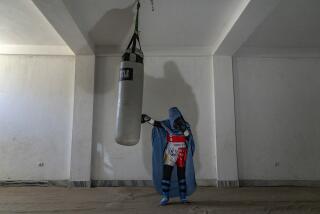Journalists’ money keeping northern alliance flush
- Share via
KHWAJA BAHAUDDIN, Afghanistan — Who says the West isn’t doing enough to help Afghanistan’s beleaguered anti-Taliban rebels?
Sure, Washington and London have yet to give the Northern Alliance as much as a single crate of ammo, a pair of boots or spare parts for their antique Soviet-era tanks. But another indirect source of foreign aid has proven to be a huge bonanza: cash-flush journalists. Straggling dazed and mud-spattered into the bleakest corner of this incredibly harsh country, a stampede of international reporters is changing the comatose economy of northern Afghanistan like nothing in its history.
Take this million-dollar mud hole, for instance. Khwaja Bahauddin once was a miserable collection of mud-brick huts where alliance commanders plotted where to fire two or three artillery shells a day at nearby Taliban positions.
Khwaja Bahauddin is still a squalid outpost at the edge of oblivion, but now the cost of living here has rocketed to levels rivaling major cities in Europe or the United States, thanks to journalists’ expense accounts.
Gasoline, another commodity the impoverished locals never had seen before, costs as much as $7 a gallon. Even media necessities such as power strips and floppy disks can be had for about 300 to 500 percent of their original price, sold alongside piles of rice.
Meanwhile, keeping all those laptops humming requires power: Afghan smugglers are trucking portable Yamaha generators across the Tajik border for $1,000 apiece.
All these baubles pale, however, in comparison to what brings in the real money: The Northern Alliance’s monopoly on services rendered to journalists. Reporters wishing to cross a river on horseback to reach the front pay $20 per mount, like some wartime dude ranch. The opposition also takes a cut on every hovel rented to foreign correspondents. And Jeeps and translators, also controlled by the rebels, come at $100 each per day.
On the Tajik side of the border, customs agents are required to ask people leaving for Afghanistan what sort of bankroll they are carrying. Anything less than $3,000 sparks derisive laughter.
“That will last you 48 hours,” one incredulous officer told a Turkish journalist crossing into Afghanistan, one of the poorest countries on Earth.
Paul Salopek writes for the Chicago Tribune, a Tribune Co. newspaper.
More to Read
Sign up for Essential California
The most important California stories and recommendations in your inbox every morning.
You may occasionally receive promotional content from the Los Angeles Times.













